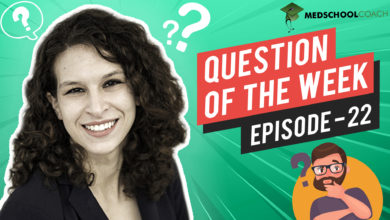Understanding Pharmacologic Prevention of Chest Pain
In Episode 74 of Med School Question of the Week for USMLE, Hussain Rao, MedSchoolCoach expert tutor, answers this medical school question:
A 68-year-old man with a past medical history of coronary artery disease, hypertension and asthma comes into clinic due to intermittent episodes of substernal chest pain and shortness of breath. These episodes occur when he is walking up stairs and during his morning exercises. His morning exercises consists of stretching and high intensity walking. He is concerned about this pain as it has impacted his ability to complete his morning workouts. His pulse is 92/min and blood pressure is 128/82. Physical examination is unremarkable and EKG shows no abnormalities. A drug that blocks which of following receptors is most likely to prevent future episodes of chest pain in this patient?
- Muscarinic receptors
- Alpha-2 adrenergic receptors
- Aldosterone receptors
- Beta-2 adrenergic receptors
- Beta-1 adrenergic receptors




